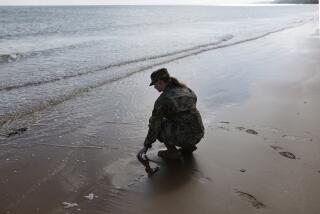Bound by Battle : World War I Buddies Remain Soldierly Amid the March of Time
- Share via
A little pang shot through Winston Roche as he walked past the cavernous auditorium that he and the other World War I veterans used to fill. Once there weren’t enough seats to hold them all. But on this Saturday morning, he and his fellow doughboys--all five--would require only the tiny conference room down the hall, with its single row of orange vinyl chairs.
There wasn’t anything remarkable about this quarterly meeting of the Veterans of World War I, 5th District, except the five men in attendance, each of them older than 90, tirelessly gallant, decorous to a fault and bonded by a war that ended 75 years ago.
“We still are giving our service to our country and we feel very honored considering our average age is 98 1/2,” Roche, 95, said proudly.
This is their chance to eat jelly doughnuts, and damn the Kaiser to hell all over again. “There is nothing for them to do, really,” said Renee Colquhoun of the group’s ladies auxiliary. “It’s just so wonderful they are still around and can come to the meeting.”
Of the 5 million soldiers who served in World War I, 36,000 are alive; 89% of them are in nursing homes and hospitals, Roche reports. He and his buddies, as they address each other, are a unique breed.
They assemble faithfully four times a year in the trademark veterans caps with the two crisp points, old medals pinned to their lapels. Their minds are keen and their memories clear, but there is not a lot of reminiscing about the battlefield. They are bonded by the past but living squarely in the present.
Roche drives a 1964 red Corvette and drag-races it once a year. He lives in North Hollywood with Elsie, his wife of 60 years. Jack Kevany, nearly 99, does his own laundry, cleans his house and tends the roses that fill his front yard. Laurance Linegar, 94, ends each meeting with a recitation of poetry from memory. Fred Brunet, 96, leads a full life in Pomona and James Rodgers, 93, still gets worked up over President Clinton’s military record.
This is their chance to be soldierly again. They cling to the ritual, even when advancing age makes ritual difficult.
“The buddies will please rise if they can,” Roche commands. His hands shake badly but he manages to elicit a sharp crack from the gavel. “The buddies will remove their hats if they can.” They all turn to face the flag, saluting it sharply.
It is time to deliver the invocation but no one can find the Bible. So Kevany wings it, flawlessly spinning a prayer on a moment’s notice that addresses God as “the eternal commander.”
How they survived a world war--where there were no C-rations and no water, where battlefield first aid was a bottle of iodine and a roll of gauze, where pilots were given two weeks to learn to fly--is as much a mystery as how they survived the 75 turbulent years that followed.
Roche is in remarkable shape. His eyesight is 20-20. (“The doctor asks me what the hell I drink.”) His lungs bother him, but that’s less from old age than from the two times he was hit with mustard gas. He never smoked, but not for lack of effort. “I tried cigarettes, couldn’t stand them. Tried a pipe, couldn’t stand it. Tried chewing tobacco, it made me sick.”
(Kevany quit smoking 20 years ago, but less for health reasons than for the fact that little sparks from his pipe kept flying down and ruining his vests.)
They seem to be outliving the organization itself. Because the members paid their lifetime membership fee years ago--then lived longer than was projected--that source of money has dried up. So they squeak by on donations. The national group all but disbanded last year for lack of funds and the ladies auxiliary had to step in. The state organization had to curtail publication of the Bugle newspaper.
Bob Johnson, a middle-aged volunteer who keeps the books, worries that there will not be enough money to continue sending aides to elderly veterans confined to their homes or hospitals.
But the five doughboys seem oblivious to all that as they punctuate their meeting with a reminder of the organization’s beginnings in Cleveland in 1948.
“We were getting older, we found ourselves being squeezed out by the rowdy, boisterous youngsters from World War II,” Roche says. “We had to go somewhere where we could maintain our dignity and our cohesiveness as buddies.”
Before the meeting ends, it is announced that Buddy Albin Olson has passed away. They are concerned that a sympathy card sent to his home was returned marked wrong address.
“That’s our greatest enemy, communication,” Roche said.
That, they note, and time.


